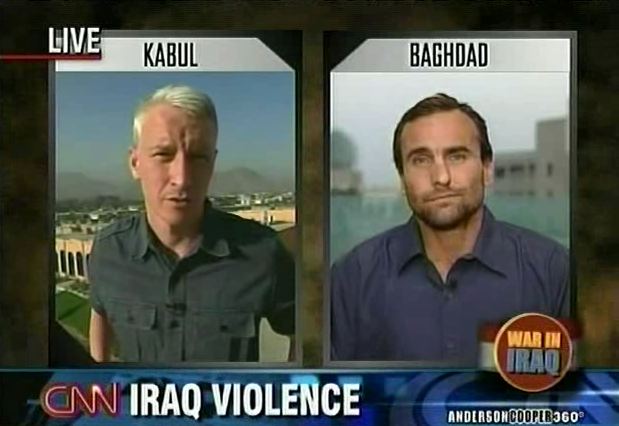AC: Baghdad, more violence

Click photo to play
Length: 3:29
COOPER: There's also been increasing violence in Iraq. CNN's Michael Ware is in Baghdad. He was recently -- he just came off an embed with the U.S. military. Michael joins me now from Baghdad.
Michael, what was the fighting like?
MICHAEL WARE, CNN CORRESPONDENT: Well, Anderson, it remains quite fierce. Obviously, it's continually evolving, the fight here in Iraq. And where we've just come from, we just got off the choppers from Ramadi, in Iraq's western al-Anbar province. And we see that it's al-Anbar and Ramadi in particular that is the centerpiece of the war against al-Qaeda in Iraq.
We heard President Bush earlier this week point to that, referring to the words of Osama bin Laden and Ayman al-Zawahiri themselves. And we also hear al-Qaeda itself talk about the importance of Ramadi. What -- to both sides, this is the front line. This is the front line with al-Qaeda, and there we see a fierce battle that continues to rage. Where in the past we saw mass assaults by al-Qaeda, with wave after wave attacking U.S. fixed positions, we've now seen that evolve in the face of new American tactics, where very much it's a sniper war. It's a war gone back to the roadside bombs, to indirect fire, to ambushes.
I mean, there's a constant drip feed of U.S. deaths there, Anderson. I mean, on average, every brigade that goes to Ramadi suffers roughly 100 U.S. deaths a year. And the brigade that's there now has been there about two and a half months says that, unfortunately, they're on track to meet that rate -- Anderson.
COOPER: It's also become clear, Michael, that the Taliban here in Afghanistan have learned from al-Qaeda, have been watching what's going on in Iraq and are adopting increasingly al-Qaeda-style tactics, suicide bombings. There have been more than 70 suicide attacks in Afghanistan this past year alone. There used to never be suicide attacks, really, in Afghanistan.
Michael, the U.S. military has handed over official control of the Iraqi military to Iraq's Prime Minister. What kind of an impact is that going to have? Are they ready to control their own military?
WARE: Well, technically, the Iraqi forces constitutionally have been under the control of -- of the Iraqi Prime Minister, but now we're seeing them come under the command of American generals, at least in word. They still cannot operate without U.S. forces, Anderson.
So you know, to some degree, this is still smoke and mirrors, but we do see Iraq trying to flex its own muscles. The signing of the deal, the formal ceremony of this handover was pushed back for several days as there was behind the scenes negotiations about the strict letter of the law of this agreement.
What it's going to mean on the ground, the effect isn't going to be that much different. This is still an American-led fight. As much as they try to put Iraqi forces to the fore, as much as they try to put an Iraqi face on it, without the U.S. military, without the increasing numbers of American soldiers, not decreasing numbers of American soldiers, this fight cannot continue. So in many ways it's still only in name -- Anderson.
COOPER: All right, Michael Ware, appreciate it, thanks. Stay safe in Baghdad.
